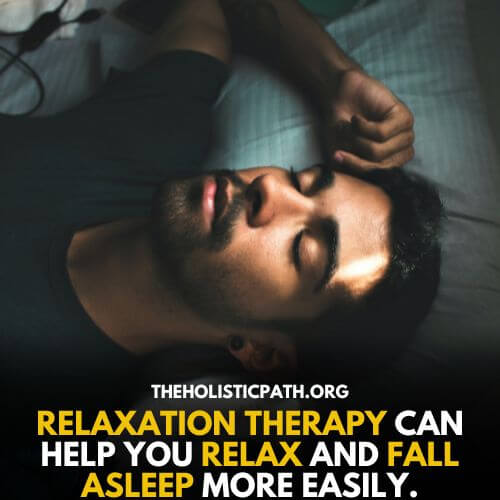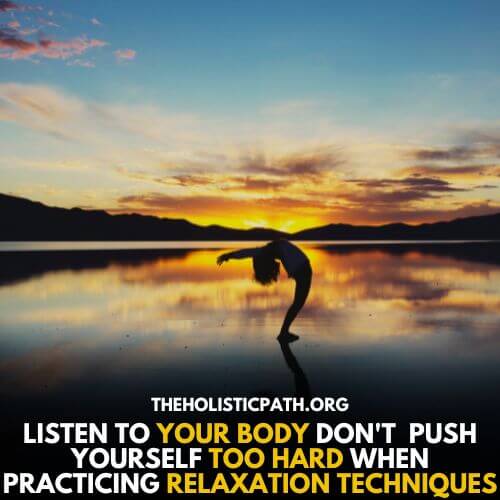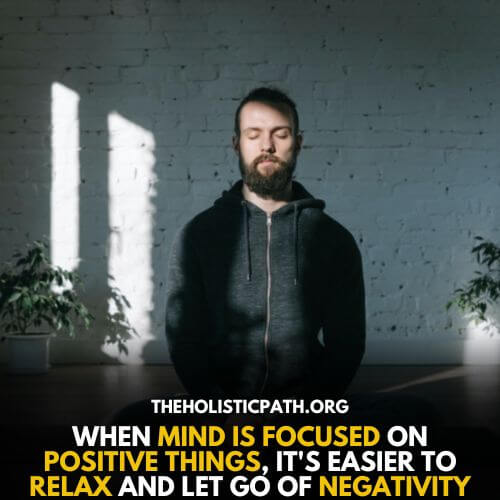On numerous accounts, you must have heard that relaxation therapy can work wonders for not only mental health but also physical health. If employed correctly, relaxation therapy can actually prove to be really beneficial.
So how does relaxation therapy work….? Let’s begin the journey of exploring how it works.
What Is Relaxation Therapy And How Does It Work
Relaxation therapy is a technique that helps the body to return to its natural resting state. It does this by slowing down the heart rate, decreasing blood pressure, and relaxing the muscles.
Relaxation therapy is a mind-body intervention that uses various techniques to promote relaxation and stress relief. It can be used to improve overall health and well-being and has been shown to be helpful for managing conditions such as anxiety, stress, and pain.
The goal of relaxation therapy is to achieve a state of deep relaxation, which is thought to promote physical and emotional health. During a session, you may use different techniques such as deep breathing, meditation, visualization, or progressive muscle relaxation. The therapist will guide you through each exercise and provide support and feedback.
What Are The Benefits of Relaxation Therapy
Research suggests that relaxation therapy can be beneficial for a variety of conditions. For example, it may help reduce symptoms of anxiety and stress, improve sleep quality, and decrease pain levels. It may also boost mood and feelings of overall well-being.
One of the benefits of relaxation therapy is that it can help improve your mood. When you’re stressed out, your body releases cortisol, which is a hormone that can make you feel anxious and irritable. Relaxation therapy can help lower your cortisol levels, which in turn can help improve your mood.
Another benefit of relaxation therapy is that it can help improve your sleep quality.

When you’re stressed out, it can be difficult to fall and stay asleep. Relaxation therapy can help you relax and fall asleep more easily. It can also help you sleep more soundly and for longer periods of time.
Relaxation therapy can also have physical benefits. It can help lower your blood pressure, heart rate, and breathing rate. It can also help reduce stress-related muscle tension and pain.
Some of the key benefits of relaxation therapy are;
- It can help improve mental health.
- It can also improve physical health.
- It can be a way to reduce stress.
- It can be a way to improve sleep quality.
- It can be a way to improve cognitive function.
How Can Relaxation Therapy Help Improve Your Mental Health
Mental health is a state of well-being. In which every individual realizes his or her own potential, can cope with the normal stresses of life, can work productively and fruitfully, and is able to make a contribution to her or his community.
There are many ways that people can improve their mental health. Relaxation therapy is one of the most effective and easiest methods. Relaxation therapy helps to improve mental health by reducing stress and anxiety.
When people are stressed out, their bodies produce more of the hormone cortisol.
Cortisol is responsible for the “fight or flight” response, which is our body’s natural way of responding to stress. When this response is activated too often or for too long, it can lead to physical and mental health problems.
Relaxation therapy helps to calm the body and mind, allowing people to manage stress more effectively. It also helps to improve moods and feelings of well-being. In addition, relaxation therapy can help to improve sleep quality and help people feel more energized during the day.
Overall, relaxation therapy is an excellent way to improve mental health. It is easy to learn and can be done anywhere, anytime. It helps to reduce stress and anxiety and improves moods and feelings of well-being.
What Are Some Common Relaxation Techniques
There are many relaxation techniques that can be employed in relaxation therapy. Some of the most common include:
1) How does relaxation therapy work -Deep breathing exercises:
Deep breathing is a simple and effective way to relax. When done properly, deep breathing can help to oxygenate the blood, calm the mind, and release tension from the body. Try box breathing, 7:7:7 breathing, or any other that works for you.
2) Progressive Muscle Relaxation:
This technique involves systematically tensing and then relaxing different muscles throughout the body. It helps to release tension and promote a sense of relaxation.
3) Guided Imagery:
This technique uses mental images and sounds to create a calming and relaxing environment. It can be used to help focus the mind and promote feelings of relaxation.
4) Mindfulness Meditation:
Mindfulness meditation is a form of mindfulness that focuses on promoting present moment awareness and relaxation. It can be helpful in reducing stress and anxiety.
5) Aromatherapy:
Aromatherapy is a type of therapy that uses essential oils to relax and rejuvenate a person. The oils are inhaled, and they help to calm and soothe the mind and body. Aromatherapy is often used in relaxation therapy because it helps to relieve stress and tension. It can also improve moods and promote a sense of well-being.
6) Repetitive Prayer:
Repetitive prayer is a form of relaxation that can be used to reduce stress. It is a simple technique that can be done by anyone, and it involves repeating a prayer or mantra over and over again. This type of prayer can help to calm the mind and body, and it can also be used to focus the mind and create a sense of peace and stillness. Repetitive prayer can also be helpful in reducing anxiety and stress-related symptoms.
Are There Any Risks Associated With Relaxation Therapy
There are a few risks associated with relaxation therapy, as it is a generally safe and natural way to improve mental health. However, there are a few things to be aware of.
First, it is important to listen to your body and not push yourself too hard when practicing relaxation techniques. If you feel uncomfortable or experience any pain, stop immediately and seek medical attention.

Second, it is important to be aware that some people may experience increased anxiety or panic attacks when practicing relaxation techniques. If this occurs, stop the exercises and seek medical help.
Finally, if you are ill with some chronic disease it’s safe to first consult a healthcare specialist so that you may not experience any adverse effects.
Tips for Relaxation Therapy
There are a variety of ways to make relaxation therapy effective. One way is to use breathing exercises. Slow, deep breaths can help to relax the body and mind.
Another way is to focus on positive thoughts and images. When the mind is focused on positive things, it can be easier to relax and let go of negative thoughts and feelings. It can also be helpful to practice relaxation techniques regularly so that they become automatic responses in times of stress.

It is also important to find a relaxation technique that works for you. Some people find it helpful to listen to calming music or use visualization techniques, while others prefer yoga or meditation.
There are several ways to make relaxation therapy more effective for both physical and mental well-being. A few easy tips are to:
- Implement a regular routine for relaxation therapy. This could involve taking a few minutes each day to practice some deep breathing exercises or meditation.
- Make time for yourself. This could be taking a relaxing bath, reading your favorite book, or spending time outside in nature.
- Find a comfortable place to relax. This could be your favorite spot on the couch, in bed, or somewhere outdoors.
- Connect with others who also practice relaxation therapy. This can help to keep you accountable and motivated to stick with your routine.
How Does Relaxation Therapy Work- The Takeaway
When it comes to relaxation therapy, there are a few things to keep in mind in order to make it as effective as possible.
First, it’s important that you find a comfortable place to relax. Whether that’s your bed, a recliner, or even just a quiet spot in your home, make sure you’re in a position where you can easily relax your muscles.
Second, make sure the environment is quiet and free from distractions. This will help you focus on the task at hand and achieve a state of relaxation more quickly.
Finally, give yourself enough time to relax. Don’t rush through the process; take your time and let yourself drift off into relaxation. With time and patience, however, you should start to see improvements in your overall well-being.
